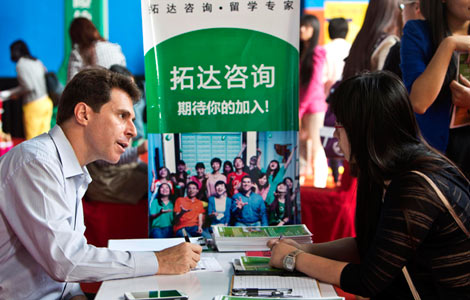China warns of emerging markets' slowing demand
Updated: 2013-10-18 11:35
(Agencies)
|
||||||||
China's exporters face a difficult time in coming months as demand from emerging markets slows, the Chinese trade ministry warned on Thursday after the latest trade data showed sales to Southeast Asia slowed sharply in September.
But China is ready to take measures to support its exporters to ensure the trade sector grows 8 percent this year as targeted, Commerce Ministry Spokesman Shen Danyang said, allowing exporters to see "mild growth" in the next few months.
"Although developed countries showed signs of recovery in recent months, some emerging economies are starting to lose growth momentum," Shen told a press briefing.
"Many risks, such as capital outflows, currency depreciation and rising inflation pressures also exacerbate the economic slowdown in emerging countries," he said.
The comments follow disappointing trade figures for September released at the weekend, which showed China's exports falling 0.3 percent, in stark contrast to market expectations for a 6 percent rise.
Sales to Southeast Asia were especially weak, with growth in September falling to a 17-month low of 10 percent from 31 percent the previous month.
Analysts say fears of possible US monetary policy tightening has hurt demand for Chinese goods as investors withdrew their money from emerging Asian economies -- China's fastest-growing export market for the past year.
Yet China has been an anomaly among emerging nations as investors retreat from riskier markets. Not only has China not seen an exodus of capital, it is instead fighting rising inflows.
China's central bank warned this week that rising capital inflows are fuelling the rate of credit expansion in the world's No 2 economy, and that authorities would fine-tune policy to keep liquidity at appropriate levels.
That capital is still flowing steadily into China was underscored by data on Thursday that showed foreign direct investment (FDI) in September rising 4.9 percent from a year ago to $8.8 billion, holding within a steady range seen this year. That took the total amount of FDI that China drew in the first nine months to $88.6 billion.
In a reflection of the global slowdown in the export sector, investors are shifting in favor of the services industry, the Commerce Ministry said.
FDI in the service sector rose 13.3 percent between January and September to $44.7 billion from the same period a year ago, accounting for 50.5 percent of total FDI.
In contrast, manufacturing investment dropped 4 percent over the same period to $35.5 billion, taking up only 40 percent of total FDI flows.
Asian investors were responsible for the bulk of the FDI, with the top Asian 10 nations accounting for 86 percent of total FDI in the first nine months, far outstripping US firms, which accounted for 3.3 percent.
European firms were responsible for 6.7 percent of Chinese FDI.
In the first nine months, China's outbound direct investment by non-financial firms rose 17.4 percent from the same period of a year ago to $61.6 billion, the ministry said.
Most Viewed
Editor's Picks

|

|

|

|

|

|
Today's Top News
US not budging on its arms restrictions on China
Can cranberries catch on in China?
Asia-Pacific pays executives world's highest salaries
US debt deal a temporary fix
China is No 1 oil importer
Millennials worried about finances
Elderly group sorry about roles in turmoil
Investigation to diagnose nation's TCM resources
US Weekly

|

|













